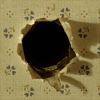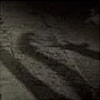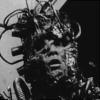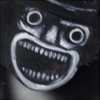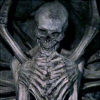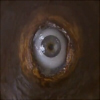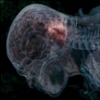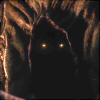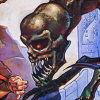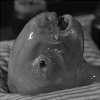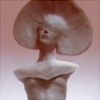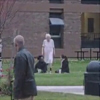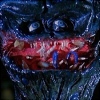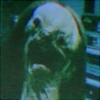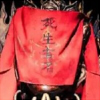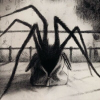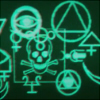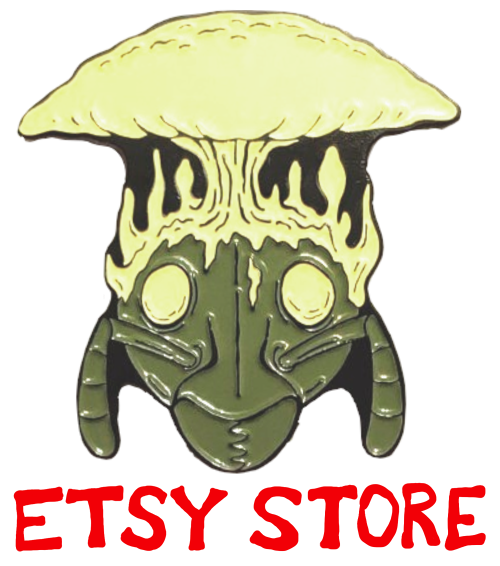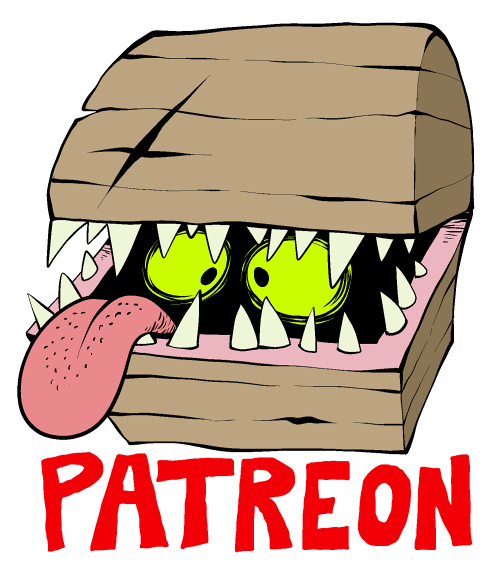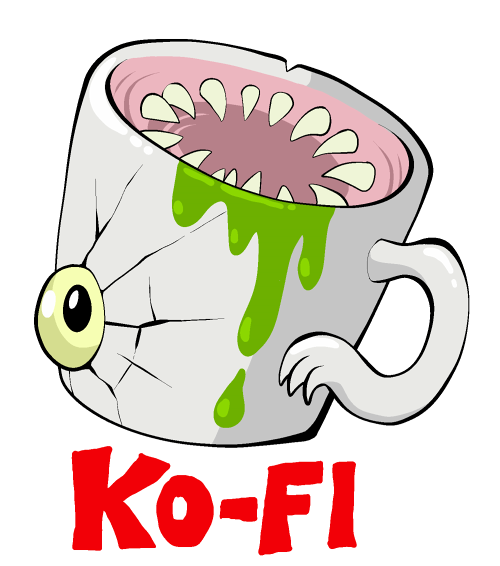By Jonathan Wojcik
ENTRY 22: POSSUM
Sort of.
The reveal of the bag's contents are gradual, but we begin to learn of a character Philip only calls "Possum," and we catch many glimpses of a strange, gangly shape before we finally see "Possum" in full glory:
"Mother, Father, what's afoot? Only Possum, black as soot.
Mother, Father, where to tread? Far from Possum and his head.
Wait awhile, my little child, for what is playing dead.
Possum, with his black balloons will eat you up in bed.
Look at Possum, there he lies. Children, meet his lifeless eyes.
See his nasty legs and tongue. When he wakens, watch him run.
Here's a bag, now what's inside? Does he seek, or does he hide?
Can you spy him, deep within? Little Possum, black as sin.
Bag is open, growing wider. What's inside it, man or spider?
Little boy, don't lose your way. Possum wants to come and play."
We have at that point seen only a few instances of Possum moving, and then only barely, but following the bonfire, Philip experiences vivid nightmares (or are they?) of Possum clambering onto his bed and finding him wherever he turns. These are kept brief and subtle, and you can enjoy a clip of what is easily one of the most haunting moments in the film:
Direct Video Link
This skin-crawling chase sequence leads Philip to locations that seem to hold meaning to him; we don't see glimpses of memory as we would in other, similar narratives, but it's obvious from Philip's reactions that unwanted memories are being triggered at every turn.
It is soon that we hear what is presumably the ending of the Possum children's book:
"The parcel opened, out it sprang, the black long-legged Possum man.
Children, run! He'll eat and smother, any child without a mother."
...Is that, in fact, the same bag that once contained the dead fox, then?
A warning may be warranted for the implications of what happens next.
He opens the trunk...and finds the missing boy in one piece, who flees the house. We don't know what becomes of Philip from there, besides the fact that he'll hopefully be cleared of any blame for his uncle's crimes. The movie ends with him only stepping outside, slumping against the wall and sitting in silence.
MONSTER ANALYSIS: POSSUM
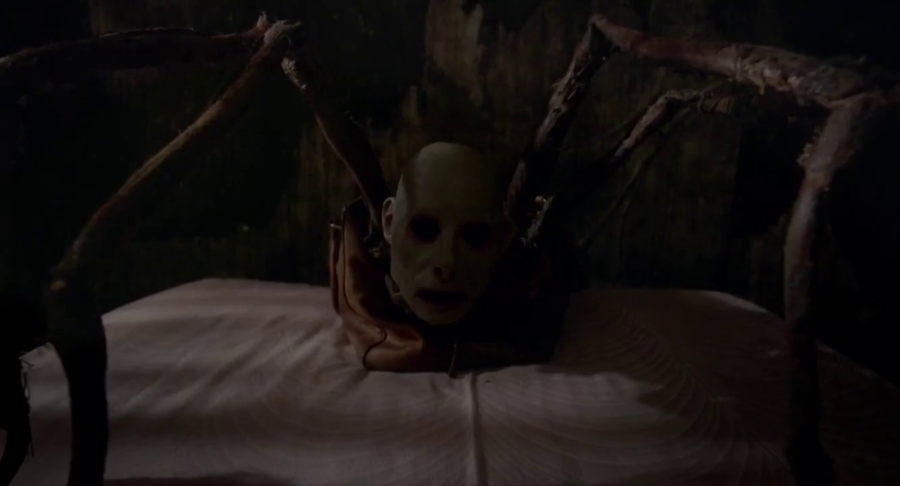
Let's have another WARNING here for the fact that this is easily darker subject matter than almost any we've previously seen, in case you hadn't gathered. By the middle of Possum's run, viewers familiar with psychological horror might think we're headed for a reveal of Philip as the true monster, that maybe the gruesome puppet is even a stand-in for the remains of a young boy Philip has murdered. Those familiar enough with psychological horror, on the other hand, might find this such an obvious route that they will correctly suspect this is all a red herring before the final reveal.
That reveal also manages to feel absolutely brutal when it comes, and I have to commend this film on communicating Philip's traumatic past without a single cheap and easy "flashback" scene. Never are we shown graphic imagery of his abuse or snippets of his childhood on-screen, nor is even the dialog ever as explicit about is as the performances themselves. By the time the credits roll we have been told more about Philip's trauma by his facial expressions alone than by even Maurice's final ravings, by the things Philip winces and shrinks at, by how difficult it is for him to speak assertively in the presence of other adults, by the places his nightmares take him.
Of all the creatures and entities we're highlighting this month, this one is the most explicitly "unreal" within the context of the film. You can interpret it as a monstrous presence if you like, but the narrative never really suggests that it's anything other than its Philip's own trauma and terror projected onto an inanimate puppet.
So...does that necessarily mean Possum isn't a "movie monster?" Does a dreadful, nonhuman on-screen figure only count as such if it's literally real to the other characters? Does this stop being a "monster movie" the moment there's an additional layer of fiction between us and its titular creature? We have already seen some monsters here that may have existed only in the minds of other characters, so can something only count as a monster if there's the "open possibility" of its literal existence within the fictional setting?
Possum is certainly a real enough, terrifying enough presence to Philip, and born, like many monsters, from terrible circumstances that should not have happened in a just and reasonable world. We can see how the puppet itself is a chimera of everything that haunts Philip; a horrible something contained within that blasted bag, something the director has said was built by philip from Taxidermy parts, if you couldn't quite gather, its shape evocative of a tangled and partially burnt corpse, of the tree where he was presumably tormented with the dead fox, and most terribly of all like his uncle's hands, as the old man is seen moving his fingers much like the legs of a spider when he tries to take one of Philip's teeth. It's all topped off with that human head, an inexpressive and emotionless reflection of Philip himself, the ultimate symbol of Possum's monstrousness being a part of him.
...But it's that monstrousness, in the end, that not only saves a child's life, but finally ends Maurice's lifetime of pure evil and enables Philip to take vengeance. Philip would have never come home at all if the puppet had not presumably ruined his reputation as a children's entertainer, and it is only Philip's nightmares of Possum that ensure he's in the right place at the right time to face his uncle before much worse happens to the kidnapped boy.
In that sense...can a "monster," in fact, consist of literally nothing but thought, even thought that any mundane human brain could conjure? We know that Dissociative Identity Disorder exists, but it usually manifests a distinct identity or "alter" that functions at least on some level like a person, or in rare cases like a familiar animal. What Philip experiences is as if his dissociated feelings and memories have produced something else altogether, something more "built from" his trauma than "born out of" his trauma; a mental homunculus of emotional scars given shape, a thing so informed by one man's pain that it cannot even imagine itself into anything but an unnatural, creeping abomination.
But as horrific as that entity is, it comes across to me as having only the best intentions that such a tortured creation ever possibly could. It only knows the language of fear and its very shape is manifested heavily from Philip's very abuser, but its communications seem so much to me like desperate cries to help, to be helped, or both, especially given its head and face; that Possum desires and/or needs Philip to finally face what created this side of him if either one are to ever know peace. His final triumph, however, is not a glorious and exhilirating one. He's defeated the unambiguously true, human monster, even saved a life, but that doesn't free him from his pain or his loneliness. He's still "broken," with no idea where to go from here. What he's done, like Possum itself, was in the end as unpleasant and hollow as it was tragically necessary.













